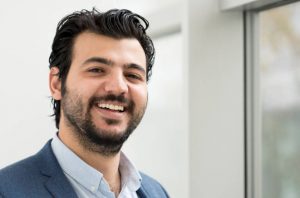
As well as collecting information from a range of sensors to improve speech intelligibility, sensors embedded within the hearing aid could estimate listening effort, and its impact on the person, and use this to tell whether the speech enhancement process is actually helping or not, according to Wolverhampton.
Named ‘Cognitively-inspired 5G-IoT enabled multi‐modal hearing aids’ (COG-MHEAR), the four-year project had been given £3.2m by the EPSRC (Engineering and physical sciences research council) under the ‘Transformative healthcare technologies for 2050’ scheme.
Cloud processing will be used initially to reduce power consumption, with low (<10ms) latency interfaces created for the cloud infrastructure link to avoid delays between acoustic data and processed image data.
Flexible e-skin electronics and custom antennas are planned to keep worn devices small.
To address power, size and latency issues, the long-term intention is to do all processing locally, running algorithms on dedicated hardware that includes accelerators.
“Our vision 2050 is to go beyond 5G-IoT and internet, for internet-independent brain-like on-chip processing to address hearing aid size, power budget, communication and cybersecurity issues,” said project deputy director Ahsan Adeel of the University of Wolverhampton (pictured).
Gathering visual information – videos of lip movement, for example – could introduce privacy issues. “We can overcome some of these questions by encrypting the data as soon as it is collected, and we will pioneer approaches for processing and understanding the video data while it stays encrypted”, according to the EPSRC grant submission. “We aim to never access the raw video data, but still to use it as a useful source of information. To complement this, we will also investigate methods for remote lip reading without using a video feed, instead exploring the use of radio signals for remote monitoring.”
Along with Edinburgh Napier University and University of Wolverhampton, project partners include: University of Edinburgh, University of Glasgow, Heriot-Watt University, University of Manchester, University of Nottingham, Sonova, Nokia Bell-Labs. Alpha Data. Digital Health & Care Institute, The Data Lab and Deaf Scotland and Action on Hearing Loss.